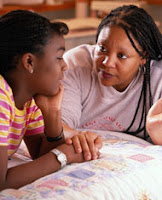Research shows that family communication about sex, contraception and pregnancy can delay the start of teenagers’ sexual activity and reduce the risk of unwanted pregnancies. And while fathers often share their concerns about their daughter’s sexual activity, mothers are usually the main communicators about sex in most families.
Even though this communication is very important, mothers and adolescent daughters often find it difficult to talk about sexuality and reproduction. As a result, daughters may not get the health care they need.
Health care providers recommend confidential health care visits for adolescent girls for screening and information. But according to a recent study published in the Annals of Family Medicine, both mothers and daughters are often hesitant to use available services. The study found that mothers strongly want to be their daughter’s first source of information and to protect them from early sexual activity, pregnancy and sexually transmitted infections.
Mothers were very uncomfortable with confidential care, even though they felt that it was important that their daughters receive the health care they needed. The daughters, too, were sometimes quite uncomfortable talking about such private matters with a health care provider. Yet about half of the girls felt that confidential care was valuable, preferring to keep their sexual status from their mothers.
The results of this small study may not apply to all mothers and their teen daughters, but they do increase our awareness of the difficult transition for both mothers and daughters as they make decisions about needed health care.









